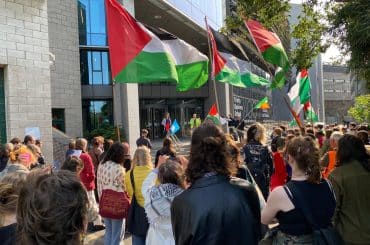Earlier this week the Boycott Divestment and Sanctions movement got a big break when Amnesty International announced that it was withdrawing from any sponsorship of Leonard Cohen’s concert in Tel Aviv next month. Today brings another.The amazing LA Times op-ed page breaks new ground in the mainstream media by running "Boycott Israel," an eloquent argument in favor of BDS from an Israeli, Neve Gordon. (Maybe some day LAT will allow Americans to weigh in on this issue?).
The piece suggests that Gordon would be for one state, because it already is one virtually, but for the "ideological" attachment of Israelis to the Jewish state. This is what Americans actually have the great power to help change, the thinking, not the geography.
Remember the charges against Jimmy Carter for saying just half of what Gordon is saying? Excerpts:
The most accurate way to describe Israel today is as an apartheid state. For more than 42 years, Israel has controlled the land between the Jordan Valley and the Mediterranean Sea. Within this region about 6 million Jews and close to 5 million Palestinians reside. Out of this population, 3.5 million Palestinians and almost half a million Jews live in the areas Israel occupied in 1967, and yet while these two groups live in the same area, they are subjected to totally different legal systems. The Palestinians are stateless and lack many of the most basic human rights. By sharp contrast, all Jews — whether they live in the occupied territories or in Israel — are citizens of the state of Israel.
The question that keeps me up at night, both as a parent and as a citizen, is how to ensure that my two children as well as the children of my Palestinian neighbors do not grow up in an apartheid regime.
There are only two moral ways of achieving this goal.
The first is the one-state solution: offering citizenship to all Palestinians and thus establishing a bi-national democracy within the entire area controlled by Israel. Given the demographics, this would amount to the demise of Israel as a Jewish state; for most Israeli Jews, it is anathema.
The second means of ending our apartheid is through the two-state solution, which entails Israel’s withdrawal to the pre-1967 borders (with possible one-for-one land swaps), the division of Jerusalem, and a recognition of the Palestinian right of return with the stipulation that only a limited number of the 4.5 million Palestinian refugees would be allowed to return to Israel, while the rest can return to the new Palestinian state.
Geographically, the one-state solution appears much more feasible because Jews and Palestinians are already totally enmeshed; indeed, "on the ground," the one-state solution (in an apartheid manifestation) is a reality.
Ideologically, the two-state solution is more realistic because fewer than 1% of Jews and only a minority of Palestinians support binationalism.
For now, despite the concrete difficulties, it makes more sense to alter the geographic realities than the ideological ones. If at some future date the two peoples decide to share a state, they can do so, but currently this is not something they want.
So if the two-state solution is the way to stop the apartheid state, then how does one achieve this goal?
I am convinced that outside pressure is the only answer. Over the last three decades, Jewish settlers in the occupied territories have dramatically increased their numbers. The myth of the united Jerusalem has led to the creation of an apartheid city where Palestinians aren’t citizens and lack basic services…
Nothing else has worked.

